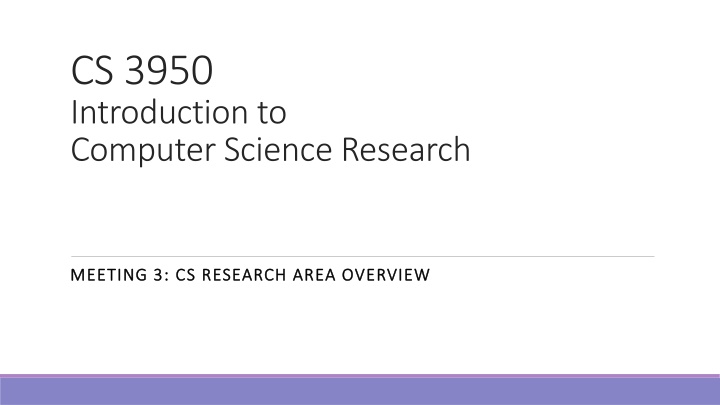
Overview of CS Research Areas and Finding Research Sources
Explore various aspects of computer science research, including the scientific method, where to find CS research, classification caveats, breakout discussions, and research area recap. Discover resources like Google Scholar, Khoury website, ACM, USENIX, IEEE conferences, and Arxiv for locating valuable research publications.
Download Presentation

Please find below an Image/Link to download the presentation.
The content on the website is provided AS IS for your information and personal use only. It may not be sold, licensed, or shared on other websites without obtaining consent from the author. If you encounter any issues during the download, it is possible that the publisher has removed the file from their server.
You are allowed to download the files provided on this website for personal or commercial use, subject to the condition that they are used lawfully. All files are the property of their respective owners.
The content on the website is provided AS IS for your information and personal use only. It may not be sold, licensed, or shared on other websites without obtaining consent from the author.
E N D
Presentation Transcript
CS 3950 Introduction to Computer Science Research MEETING 3: CS RESEARCH AREA OVERVIEW MEETING 3: CS RESEARCH AREA OVERVIEW
Agenda for today Recap from last week Breakout discussions for field trip homework assignment Have your assignments loaded in your browser and ready to discuss Readout from breakout discussions Preview for next week s paper (RAID) 2
Recap Research as science Scientific Method Computer Science as a field Science, engineering, and math Where do you find research products 3
Where do you find CS research Google (Scholar) Khoury website (khoury.northeastern.edu) Search by area/project Visit faculty (and student/postdoc) pages ACM, USENIX, and IEEE conferences/journals Access from NEU network to get around paywalls Which ones to focus on? CS Rankings can help (https://csrankings.org) Arxiv Wild west of papers, some areas highly respected, others not Often a good way to find papers outside a paywall 4
Caveats There are many ways to classify research areas, none is perfect Khoury: 15 areas csrankings.org: AI, Systems, Theory, Interdisciplinary Areas ACM SIGs: 37 special interest groups Research may fall into multiple categories I study networked systems, measuring them for privacy violations and security issues Treat research area names as a matter of convenience 5
Breakout discussions High-level overview Already created 15 breakout rooms (one per area) + 2 overflows Join the breakout room for the first research area you chose in your homework Appoint a notetaker Go around the room, each person says why they picked the area Each person in the room spends at most 3 minutes describing their topics and research categories Come back to the main room, notetaker summarizes discussion Repeat for second research area 6
Breakout Recap During each readout, notetaker Summarizes why people chose the research area Summarizes topics and whether they are science/engineering/math Just pick a handful (most popular, e.g.), don t rehash every research area Are they mostly one, two or three? Which ones? 7
Cetera Target time for each breakout room is 20 minutes (be efficient) I ll float between rooms to check in, no need to stop for me There will be imbalances across rooms If too many in one room, I will direct some students to an overflow room If too few in a room, I will merge with other small groups/singletons Ideally, nobody is notetaker twice 8
Research areas for discussion Algorithms & theory Artificial intelligence Data science Formal methods Games Human-centered computing Machine learning Natural language processing & Information retrieval Network science Personal health informatics Programming languages Robotics Security & privacy Software engineering Systems and networking 9
Background for RAID Moore s Law Memory hierarchy Magnetic disks (of the spinning variety) Workload sensitivity MTTF 10
Background for RAID Independent and exponentially distributed events ECC / parity 11
